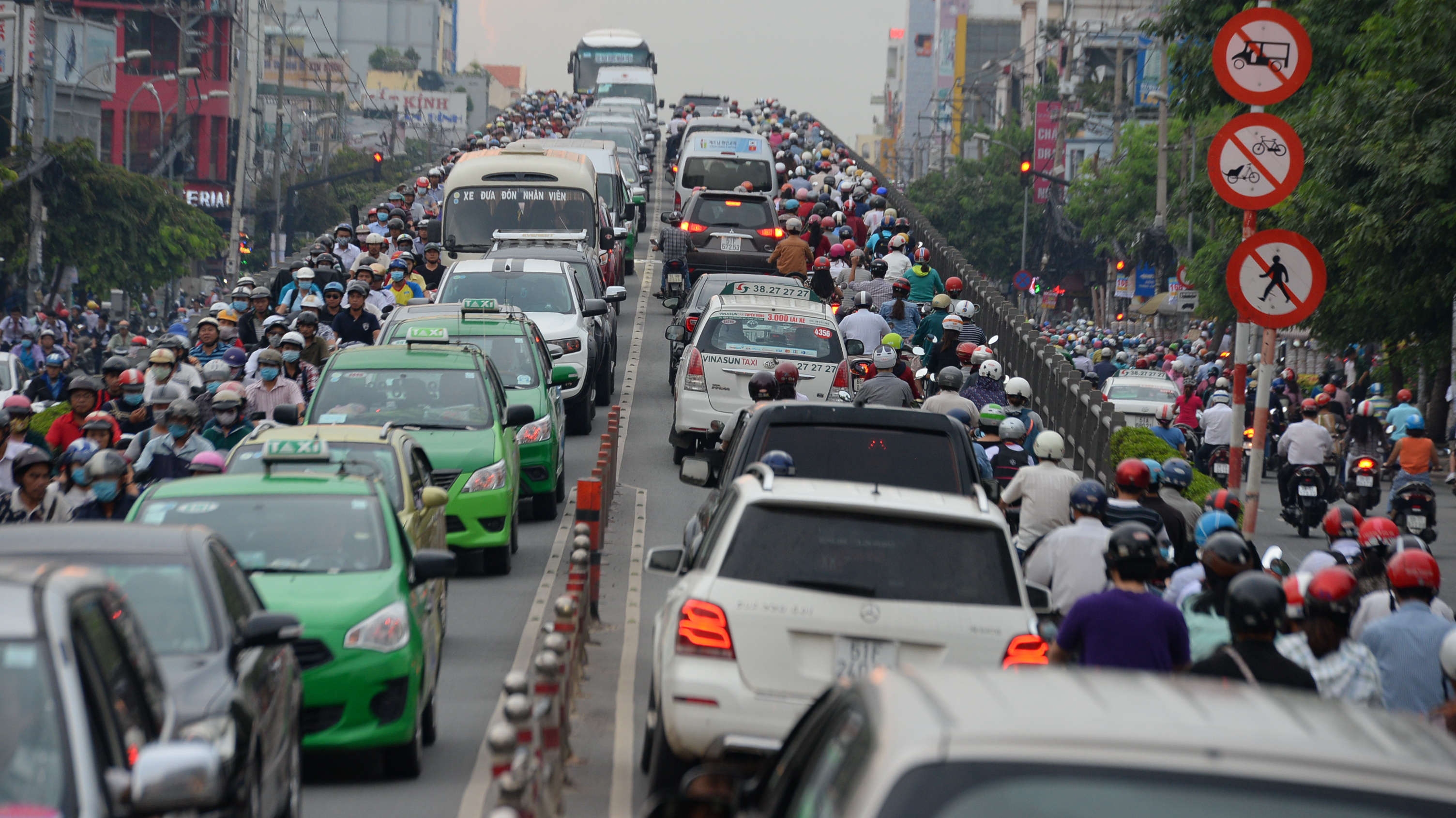The banning of motorbikes in major Vietnamese cities to combat worsening traffic congestion is once again on the table after Hanoi’s Department of Transport on Monday unveiled its plan to restrict non-resident motorbikes from entering the capital by 2025.
In 2013, a government-approved development plan to reduce land-road traffic in Vietnam by 2020 speculated that there would be 36 million motorbikes and 3.5 million cars in the country by that year.
There are still four years to go until the deadline, but 45 million motorbikes are already roaming Vietnam’s roads. At current rates that number is expected to reach 60 million by 2020.
“Vietnam’s motorbike planning has been completely disrupted,” Dr. Luong Hoai Nam, economic expert and former CEO at Vietnam-based low-cost airline Jetstar Pacific, said in an interview with Tuoi Tre (Youth) newspaper.
Nam has been a dedicated and vocal proponent of banning motorbikes in major cities as a countermeasure to traffic congestion ever since the discussion was first brought up in Vietnam.
The economic expert said his interest in the issue took shape in 2007, when he first heard of a similar move by China’s Guangzhou administration.
“I was so thrilled. After some further study, I found that Guangzhou was only following the footsteps of Beijing and Shanghai, where the ban had been in place for much longer. There are currently around 150 Chinese cities where motorbikes are prohibited,” Nam explained of his support for the ban in Vietnam.
Nam said cities with similar or even less developed economies than Vietnam’s are also taking steps to implement a ban on motorbikes, citing Yangon and Jakarta, the respective capitals of Myanmar and Indonesia, Vietnam’s regional neighbors in Southeast Asia.
“You can do the math. There are currently 7.5 million motorbikes registered in Ho Chi Minh City, and an additional one million non-resident motorbikes moving around the city each day. With 3,750 kilometers of road in total, Ho Chi Minh City handles over 2,000 motorbikes on every kilometer of its roads,” Nam explained.
“With 500,000 additional motorbikes registered each year, in five years we won’t be able to move an inch on our roads,” Nam stressed.

Dr. Luong Hoai Nam, economic expert and former CEO at Jetstar Pacific Airlines. Photo: Tuoi Tre

An infographic of the number of personal vehicles registered in Ho Chi Minh City over the years (Yellow line, red line, and blue columns demonstrate numbers of cars, motorbikes, and collective personal vehicles respectively; numbers shown are in thousands for cars and millions for bikes and collective personal vehicles). Graphic by Tuoi Tre using figures provided by Ho Chi Minh City's Department of Transport.
The expert added that a ban on motorbikes must be accompanied by the equal development of public transport to handle the massive shift in public commuting habits.
The convenience of a motorbike, which enables one to get virtually anywhere in Vietnamese cities without any additional walking, has stripped Vietnamese city-dwellers of the habits of walking or taking public transport in their daily commute, Nam remarked.
In response to a question on whether a ban on personal motorbikes, but not cars, would be unfair for those who could not afford a car, Nam said Vietnam should learn from Singapore to set a cap on the number of new car registrations each year, while imposing high fees on those who drive personal cars into the city center or at rush hour.
“This is why most people in Singapore or Hong Kong still prefer public transport in their daily commute despite owning a car, as the cost of driving a car is too high,” Nam said.
According to Nam, buses would be the most suitable form of public transport for Hanoi and Ho Chi Minh City, for only these vehicles can carry commuters through the complex network of small roads typical of each city.
The cities would each need 30,000 buses, at the cost of VND3 billion (US$133,929), to sufficiently handle the influx of commuters, according to Nam's estimations.
Nam added that Ho Chi Minh City also lacks a trans-city highway connecting Tan Son Nhat International Airport with the Phu My Hung area in District 7, allowing vehicles to travel directly between the two ends of the city without going through winding roads filled with intersections.
Meanwhile, urban traffic expert Dr. Nguyen Xuan Thuy was not so thrilled with the idea of banning motorbikes in Vietnamese cities.
“How is the 80 percent of the Vietnamese population using personal motorbikes to commute after the ban?” Thuy raised the question.
According to Thuy, until public transport in the country becomes more developed a ban on personal motorbikes would make traffic congestion even worse.
Thuy said the people will give up their personal motorbikes, even without a ban, as soon as public transport is made more convenient.
“The people must have the freedom to choose for themselves. This is not a matter of imposition,” Nam concluded.
Like us on Facebook or follow us on Twitter to get the latest news about Vietnam!





















































